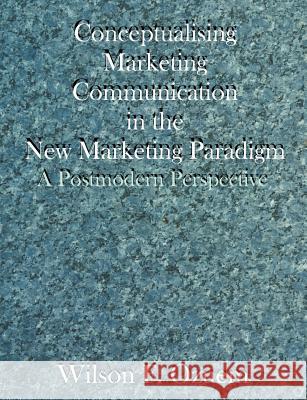Conceptualising Marketing Communication in the New Marketing Paradigm: A Postmodern Perspective » książka
Conceptualising Marketing Communication in the New Marketing Paradigm: A Postmodern Perspective
ISBN-13: 9781581122473 / Angielski / Miękka / 2004 / 276 str.
There has been a lot of interest among marketing practitioners and researchers in the concept of marketing communications as related to computer-mediated marketing environments as a result of the commercialization of the World Wide Web (WWW) as a marketing and communication medium. Despite growing interest, there is a dearth of research on the processual nature of communication between marketers and consumers. The overall aim of this study, therefore, is to expand our understanding of marketing communication within the computer-mediated marketing environments. This understanding is achieved in the thesis by incorporating ideas from traditional marketing communication models those based on a one-way, general outbound, linear model in which marketers deliver communication to customers and prospects and contemporary marketing communications theory within a contextualist framework, to examine the evolving marketing communication medium. Given the growing empowerment of customers through information technology that has created the interactive marketplace, the study aims to illuminate concretely that Internet exerts a mediating influence on the relationship between marketers and consumers. Following this articulation, the study considers computer-mediated marketing environments as a technological development that increases the options for marketing communications. Placing marketing communication and computer-mediated marketing environments within a historical context of technology as consistent with social constructivist framework rather than thinking about the medium as an isolated phenomenon, builds the base for understanding the opportunities and difficulties associated with marketing communications and the Internet in contrast to capabilities for marketing prior to the Internet. The current study indicates that marketing communication in the computer-mediated marketing environments possess some fundamental uniqueness, which are ancillary and augment the consumption processes. The study proposed a conceptual framework for understanding marketing communication trajectory in the evolving interactive marketplace. The framework proposed provides a new base for developing a wide range of marketing communication programmes for practitioners and academic researchers.
There has been a lot of interest among marketing practitioners and researchers in the concept of marketing communications as related to computer-mediated marketing environments as a result of the commercialization of the World Wide Web (WWW) as a marketing and communication medium. Despite growing interest, there is a dearth of research on the processual nature of communication between marketers and consumers. The overall aim of this study, therefore, is to expand our understanding of marketing communication within the computer-mediated marketing environments. This understanding is achieved in the thesis by incorporating ideas from traditional marketing communication models those based on a one-way, general outbound, linear model in which marketers deliver communication to customers and prospects and contemporary marketing communications theory within a contextualist framework, to examine the evolving marketing communication medium. Given the growing empowerment of customers through information technology that has created the interactive marketplace, the study aims to illuminate concretely that Internet exerts a mediating influence on the relationship between marketers and consumers.Following this articulation, the study considers computer-mediated marketing environments as a technological development that increases the options for marketing communications. Placing marketing communication and computer-mediated marketing environments within a historical context of technology as consistent with social constructivist framework rather than thinking about the medium as an isolated phenomenon, builds the base for understanding the opportunities and difficulties associated with marketing communications and the Internet in contrast to capabilities for marketing prior to the Internet. The current study indicates that marketing communication in the computer-mediated marketing environments possess some fundamental uniqueness, which are ancillary and augment the consumption processes. The study proposed a conceptual framework for understanding marketing communication trajectory in the evolving interactive marketplace. The framework proposed provides a new base for developing a wide range of marketing communication programmes for practitioners and academic researchers.











